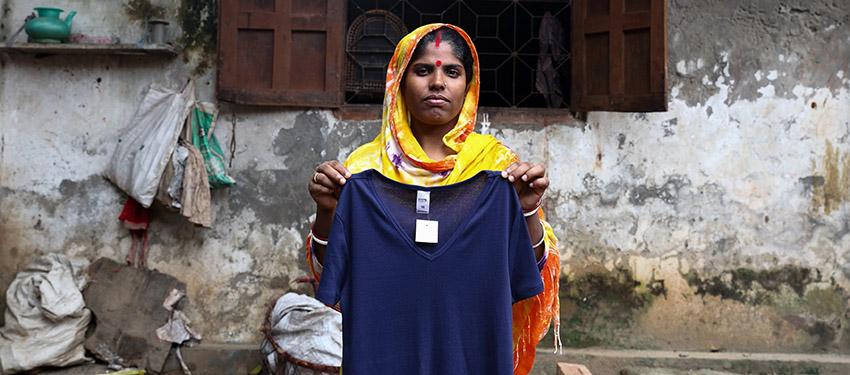Textile, a sector based on exploitation
The majority of fashion brands outsource the making of their garments to low-income countries like Bangladesh. The workers there are subjected to dangerous working conditions, for starvation wages. Oxfam is campaigning for these signs to have the obligation to guarantee their social rights.
In 2013, the collapse of Rana Plaza, a building housing five garment factories in Dhaka, caused the death of 1,138 textile workers, mostly women. Following this tragedy, the Bangladeshi State and the multinational clothing companies that had their clothes made there at a lower cost pledged to improve the safety and working conditions of the workers. But for what assessment today? Eight years later, Oxfam conducted the survey among 400 workers.
The conclusions, published in a lengthy report entitled “Made in Poverty”, are staggering: 9 out of 10 female workers cannot afford to feed their families enough, live in decent housing or even cover school fees. Unsurprisingly, none of the 400 respondents wanted their children to work in a textile factory one day.
A salary of 80 euros per month
Chameli (photo) is one of the 5 million workers who make Bangladesh the world's second largest clothing exporter, behind China. His dearest dream? Break the cycle of poverty in which her family is trapped by providing an education to her daughters. A dream that remains out of reach for the moment. “What I earn doesn't allow me to send my three daughters to school,” regrets Chameli.
Unable to make ends meet, she had to make the difficult decision to send her eldest daughter, 14, to work in a garment factory. Yet Chameli spends 11 hours a day behind a sewing machine making T-shirts, shorts and miniskirts for a chain of Australian stores. “I earn €80 a month, even €100 with my overtime,” she says. A threshold that the 33 cents she earns for each hour of work never allow her to exceed.

“According to the unions, the minimum living wage should be €368 per month, more than four times that of an average worker,” explains Mahmuda Sultana, advocacy officer for Oxfam Bangladesh. "Since the tragedy of 2013, many brands have made efforts to improve workshop safety and minimum wages for the lowest paid workers have doubled," she concedes. But this remains derisory in view of the increase in the cost of living since 2013, especially that of housing.
Unions demand better wages
Yet the fashion industry brings in a lot of money. It is estimated to be worth 3,000 billion dollars. But the sale of clothes does not benefit the workers. Of the price of a t-shirt sold at €29, 68% is dedicated to the brand's margin. The factory in Bangladesh pockets 4%, while the worker's salary represents only 0.6% of the final price.
Something to revolt Bindu (photo) who has been working for 10 years in a workshop in Dhaka, the capital. Tired of overwork and a pittance, she decides to set up a union with the help of eight colleagues. “I realized that our bosses owed us a lot more than we got and that if we didn't organize, we wouldn't be paid,” Bindu recalls. Very quickly, the union won its first victory: 150 workers obtained payment for the overtime hours owed to them. But the acts of intimidation did not take long.
In March 2018, Bindu was summoned to the general manager's office. “He accused me of being a disruptive element in the workshop. He tried to kick me out but I refused to sign the dismissal notice. Bindu is still a trade unionist in the same workshop today, but the employees who took part in the action are more than ever in the sights of management.
Pressure from trade unions and NGOs, including Oxfam, led to the lowering of the number of workers needed to form a union and the removal of the prior consent of the factory boss. This has allowed 400 unions to emerge in the 5,000 factories in the country. Significant progress, but Bindu's story shows how frequent harassment of trade unionists remains in garment factories.
Duty of vigilance of fast fashion
The Rana Plaza tragedy illustrated the impunity enjoyed by disposable fashion multinationals, which until then had not been legally responsible for the social impacts caused by their international activity. But things are starting to move: the Belgian and European Parliaments are each studying a bill aimed at holding companies responsible for the violations they help to cause.
If these laws pass, it would be a major step forward according to the unions and NGOs, including Oxfam, which have been pressuring the political world to legislate in this direction for years. “While the draft law before the Belgian parliament is not perfect, it could have a positive impact on the lives of millions of people because it would allow victims to go to court for violations caused by companies or their contractors,” concludes Sarah Vaes, Advocacy Officer at Oxfam Belgium.
Download the “Made in poverty” report
Photos: Fabeha Monir/Oxfam









